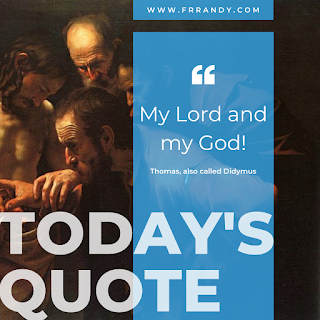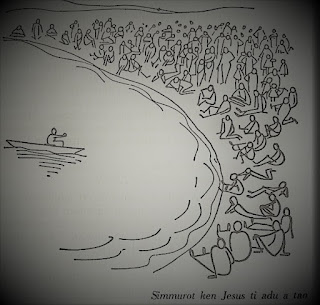The Believing Thomas, With Due Respect
A Reflection on the Gospel for the Second Sunday of Easter (Divine Mercy Sunday)
The Courageous Thomas
"Let us also go, that we may die with him" (John 11:16). These are the words of Thomas as he addresses his fellow disciples.
The occasion: the eve of Jesus' passion.
News of the illness of Lazarus, a close friend of Jesus, reached the Master and his disciples. Jesus waits for two days on the other side of the Jordan River, as if to give Lazarus the dignity of dying and being raised again. Jesus is determined to go to Bethany near Jerusalem. His disciples are afraid of the consequences.
The last time he was there, he was almost stoned to death (cf. John 10:31).
So, the disciples restrain him: "Rabbi, the Jews were just now trying to stone you, and are you going there again" (John 11:18)? But Thomas persuades his fellow disciples to go with their Master and die with him. They heed Thomas.
Thomas's reaction is straightforward—he means what he says.
Unlike Peter, who makes an empty promise to Jesus to remain faithful until death (cf. John 13:36-38, Note that Peter talks to Jesus alone), Thomas intends his words for his fellow disciples.
It is perhaps for this reason that Thomas will stand out among the disciples in encountering the Risen Lord after his resurrection.
The So-Called Doubting Thomas
Today's interpretation of this Sunday Gospel text is often colored by the English expression "doubting Thomas" (a synonym for "cynic, disbeliever, doubter").
Indeed, Thomas becomes a late believer in Jesus' resurrection, but never too late to formulate the most profound and radical confession of the divinity of Jesus in the gospels: HO KYRIOS MOU KAI HO THEOS MOU ("My Lord and my God," John 20:28).
A disciple who had not remained faithful to Jesus when the latter faced violent death needs to make a kind of oath of allegiance to the Master after the resurrection.
This act is what Peter does when he meets the Risen Lord at the Lake of Tiberias (cf. John 21:1-17). Thomas does not need such a renewal of vow. He has been faithful to his Master.
Thomas is a kind of model disciple, one who sincerely seeks to understand the message of Jesus (see John 14:5) and, at the same time, commits himself to the person of Jesus.
Without fear, he announces in public his readiness to share the violent death of the Master and thus accompanies him on his way to Jerusalem.
------
Read if you can:
Johannes Beutler, "Faith and Confession: The Purpose of John" in J. Painter, R. Alan Culpepper and F. F. Segovia (eds.), Word, Theology, and Community in John (St. Louis, MS: Chalice Press, 2002), pp. 19-29.
Raymond Brown, A Risen Christ in Eastertime: Essays on the Gospel Narratives of the Resurrection (Collegeville, Minnesota: Liturgical Press, 1991).


